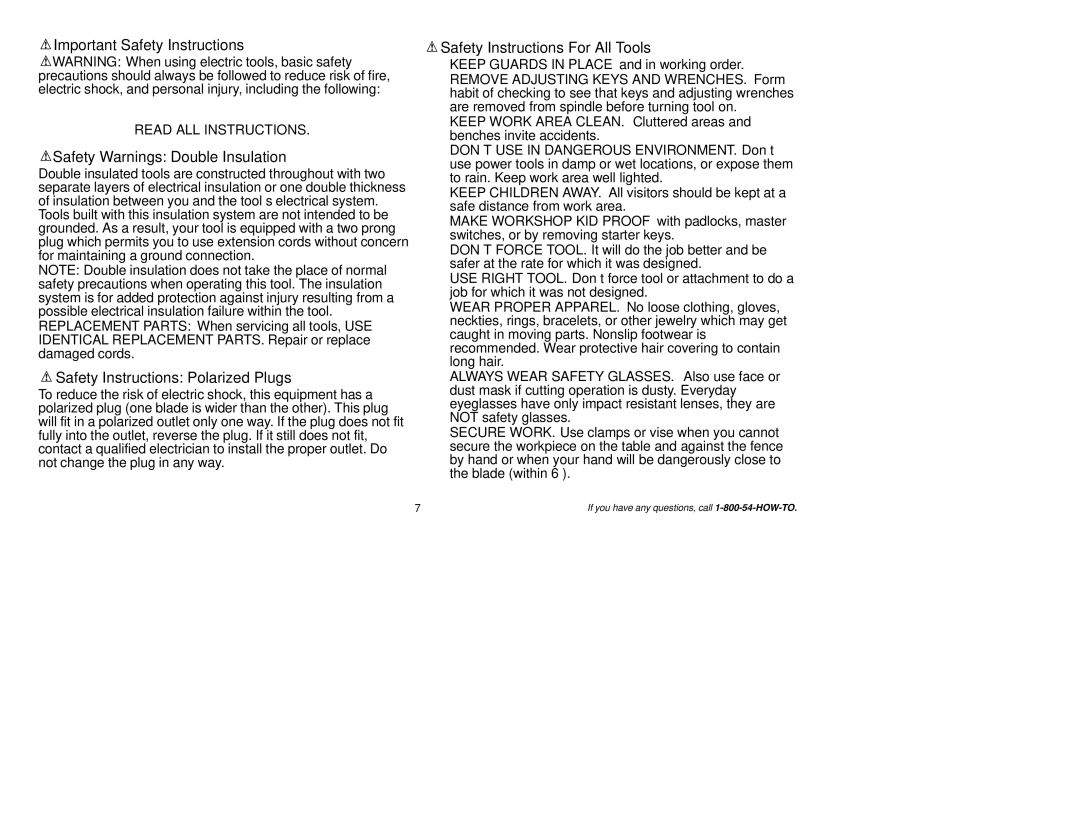 Important Safety Instructions
Important Safety Instructions
![]() WARNING: When using electric tools, basic safety precautions should always be followed to reduce risk of fire, electric shock, and personal injury, including the following:
WARNING: When using electric tools, basic safety precautions should always be followed to reduce risk of fire, electric shock, and personal injury, including the following:
READ ALL INSTRUCTIONS.
 Safety Warnings: Double Insulation
Safety Warnings: Double Insulation
Double insulated tools are constructed throughout with two separate layers of electrical insulation or one double thickness of insulation between you and the tool’s electrical system. Tools built with this insulation system are not intended to be grounded. As a result, your tool is equipped with a two prong plug which permits you to use extension cords without concern for maintaining a ground connection.
NOTE: Double insulation does not take the place of normal safety precautions when operating this tool. The insulation system is for added protection against injury resulting from a possible electrical insulation failure within the tool. REPLACEMENT PARTS: When servicing all tools, USE IDENTICAL REPLACEMENT PARTS. Repair or replace damaged cords.
 Safety Instructions: Polarized Plugs
Safety Instructions: Polarized Plugs
To reduce the risk of electric shock, this equipment has a polarized plug (one blade is wider than the other). This plug will fit in a polarized outlet only one way. If the plug does not fit fully into the outlet, reverse the plug. If it still does not fit, contact a qualified electrician to install the proper outlet. Do not change the plug in any way.
 Safety Instructions For All Tools
Safety Instructions For All Tools
•KEEP GUARDS IN PLACE and in working order.
•REMOVE ADJUSTING KEYS AND WRENCHES. Form habit of checking to see that keys and adjusting wrenches are removed from spindle before turning tool on.
•KEEP WORK AREA CLEAN. Cluttered areas and benches invite accidents.
•DON’T USE IN DANGEROUS ENVIRONMENT. Don’t use power tools in damp or wet locations, or expose them to rain. Keep work area well lighted.
•KEEP CHILDREN AWAY. All visitors should be kept at a safe distance from work area.
•MAKE WORKSHOP KID PROOF with padlocks, master switches, or by removing starter keys.
•DON’T FORCE TOOL. It will do the job better and be safer at the rate for which it was designed.
•USE RIGHT TOOL. Don’t force tool or attachment to do a job for which it was not designed.
•WEAR PROPER APPAREL. No loose clothing, gloves, neckties, rings, bracelets, or other jewelry which may get caught in moving parts. Nonslip footwear is recommended. Wear protective hair covering to contain long hair.
•ALWAYS WEAR SAFETY GLASSES. Also use face or dust mask if cutting operation is dusty. Everyday eyeglasses have only impact resistant lenses, they are NOT safety glasses.
•SECURE WORK. Use clamps or vise when you cannot secure the workpiece on the table and against the fence by hand or when your hand will be dangerously close to the blade (within 6”).
7 | If you have any questions, call |
